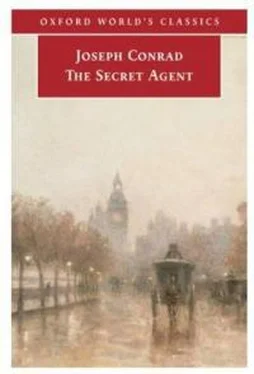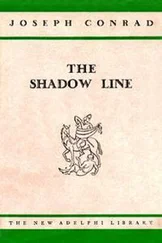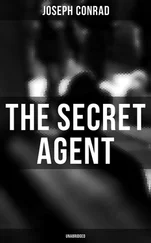Undemonstrative and burly in a fat–pig style, Mr Verloc, without either rubbing his hands with satisfaction or winking sceptically at his thoughts, proceeded on his way. He trod the pavement heavily with his shiny boots, and his general get–up was that of a well–to–do mechanic in business for himself. He might have been anything from a picture–frame maker to a lock–smith; an employer of labour in a small way. But there was also about him an indescribable air which no mechanic could have acquired in the practice of his handicraft however dishonestly exercised: the air common to men who live on the vices, the follies, or the baser fears of mankind; the air of moral nihilism common to keepers of gambling hells and disorderly houses; to private detectives and inquiry agents; to drink sellers and, I should say, to the sellers of invigorating electric belts and to the inventors of patent medicines. But of that last I am not sure, not having carried my investigations so far into the depths. For all I know, the expression of these last may be perfectly diabolic. I shouldn't be surprised. What I want to affirm is that Mr Verloc's expression was by no means diabolic.
Before reaching Knightsbridge, Mr Verloc took a turn to the left out of the busy main thoroughfare, uproarious with the traffic of swaying omnibuses and trotting vans, in the almost silent, swift flow of hansoms. Under his hat, worn with a slight backward tilt, his hair had been carefully brushed into respectful sleekness; for his business was with an Embassy. And Mr Verloc, steady like a rock—a soft kind of rock—marched now along a street which could with every propriety be described as private. In its breadth, emptiness, and extent it had the majesty of inorganic nature, of matter that never dies. The only reminder of mortality was a doctor's brougham arrested in august solitude close to the curbstone. The polished knockers of the doors gleamed as far as the eye could reach, the clean windows shone with a dark opaque lustre. And all was still. But a milk cart rattled noisily across the distant perspective; a butcher boy, driving with the noble recklessness of a charioteer at Olympic Games, dashed round the corner sitting high above a pair of red wheels. A guilty–looking cat issuing from under the stones ran for a while in front of Mr Verloc, then dived into another basement; and a thick police constable, looking a stranger to every emotion, as if he too were part of inorganic nature, surging apparently out of a lamp–post, took not the slightest notice of Mr Verloc. With a turn to the left Mr Verloc pursued his way along a narrow street by the side of a yellow wall which, for some inscrutable reason, had No. 1 Chesham Square written on it in black letters. Chesham Square was at least sixty yards away, and Mr Verloc, cosmopolitan enough not to be deceived by London's topographical mysteries, held on steadily, without a sign of surprise or indignation. At last, with business–like persistency, he reached the Square, and made diagonally for the number 10. This belonged to an imposing carriage gate in a high, clean wall between two houses, of which one rationally enough bore the number 9 and the other was numbered 37; but the fact that this last belonged to Porthill Street, a street well known in the neighbourhood, was proclaimed by an inscription placed above the ground–floor windows by whatever highly efficient authority is charged with the duty of keeping track of London's strayed houses. Why powers are not asked of Parliament (a short act would do) for compelling those edifices to return where they belong is one of the mysteries of municipal administration. Mr Verloc did not trouble his head about it, his mission in life being the protection of the social mechanism, not its perfectionment or even its criticism.
It was so early that the porter of the Embassy issued hurriedly out of his lodge still struggling with the left sleeve of his livery coat. His waistcoat was red, and he wore knee–breeches, but his aspect was flustered. Mr Verloc, aware of the rush on his flank, drove it off by simply holding out an envelope stamped with the arms of the Embassy, and passed on. He produced the same talisman also to the footman who opened the door, and stood back to let him enter the hall.
A clear fire burned in a tall fireplace, and an elderly man standing with his back to it, in evening dress and with a chain round his neck, glanced up from the newspaper he was holding spread out in both hands before his calm and severe face. He didn't move; but another lackey, in brown trousers and claw–hammer coat edged with thin yellow cord, approaching Mr Verloc listened to the murmur of his name, and turning round on his heel in silence, began to walk, without looking back once. Mr Verloc, thus led along a ground–floor passage to the left of the great carpeted staircase, was suddenly motioned to enter a quite small room furnished with a heavy writing–table and a few chairs. The servant shut the door, and Mr Verloc remained alone. He did not take a seat. With his hat and stick held in one hand he glanced about, passing his other podgy hand over his uncovered sleek head.
Another door opened noiselessly, and Mr Verloc immobilising his glance in that direction saw at first only black clothes, the bald top of a head, and a drooping dark grey whisker on each side of a pair of wrinkled hands. The person who had entered was holding a batch of papers before his eyes and walked up to the table with a rather mincing step, turning the papers over the while. Privy Councillor Wurmt, Chancelier d'Ambassade, was rather short–sighted. This meritorious official laying the papers on the table, disclosed a face of pasty complexion and of melancholy ugliness surrounded by a lot of fine, long dark grey hairs, barred heavily by thick and bushy eyebrows. He put on a black–framed pince–nez upon a blunt and shapeless nose, and seemed struck by Mr Verloc's appearance. Under the enormous eyebrows his weak eyes blinked pathetically through the glasses.
He made no sign of greeting; neither did Mr Verloc, who certainly knew his place; but a subtle change about the general outlines of his shoulders and back suggested a slight bending of Mr Verloc's spine under the vast surface of his overcoat. The effect was of unobtrusive deference.
"I have here some of your reports," said the bureaucrat in an unexpectedly soft and weary voice, and pressing the tip of his forefinger on the papers with force. He paused; and Mr Verloc, who had recognised his own handwriting very well, waited in an almost breathless silence. "We are not very satisfied with the attitude of the police here," the other continued, with every appearance of mental fatigue.
The shoulders of Mr Verloc, without actually moving, suggested a shrug. And for the first time since he left his home that morning his lips opened.
"Every country has its police," he said philosophically. But as the official of the Embassy went on blinking at him steadily he felt constrained to add: "Allow me to observe that I have no means of action upon the police here."
"What is desired," said the man of papers, "is the occurrence of something definite which should stimulate their vigilance. That is within your province—is it not so?"
Mr Verloc made no answer except by a sigh, which escaped him involuntarily, for instantly he tried to give his face a cheerful expression. The official blinked doubtfully, as if affected by the dim light of the room. He repeated vaguely.
"The vigilance of the police—and the severity of the magistrates. The general leniency of the judicial procedure here, and the utter absence of all repressive measures, are a scandal to Europe. What is wished for just now is the accentuation of the unrest—of the fermentation which undoubtedly exists—"
"Undoubtedly, undoubtedly," broke in Mr Verloc in a deep deferential bass of an oratorical quality, so utterly different from the tone in which he had spoken before that his interlocutor remained profoundly surprised. "It exists to a dangerous degree. My reports for the last twelve months make it sufficiently clear."
Читать дальше












